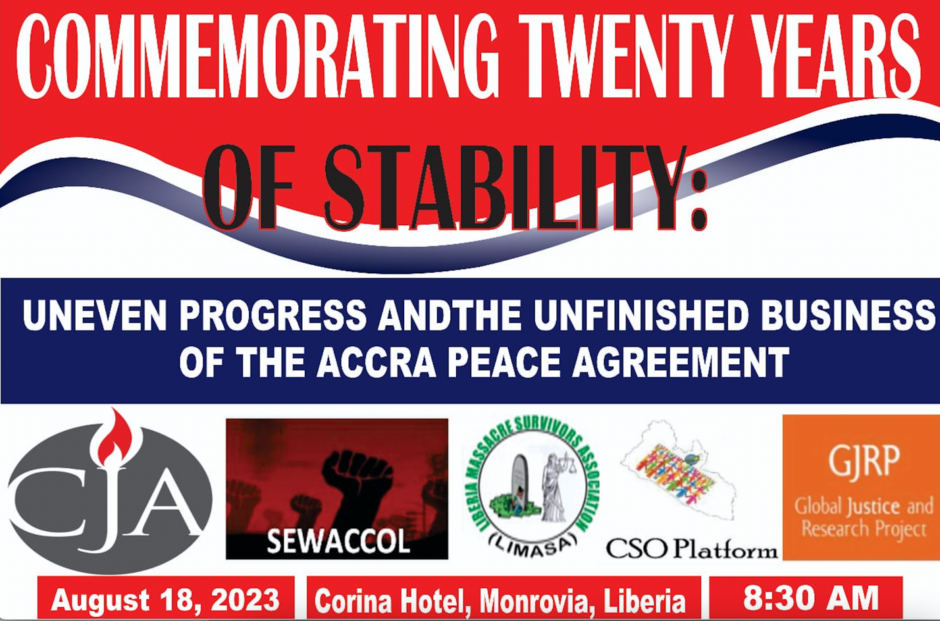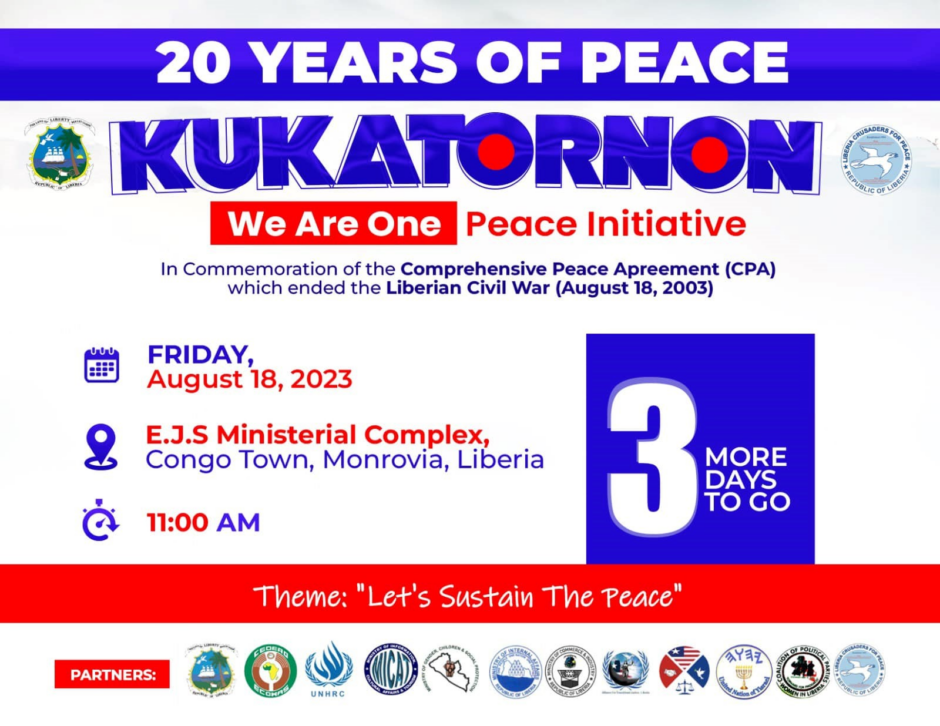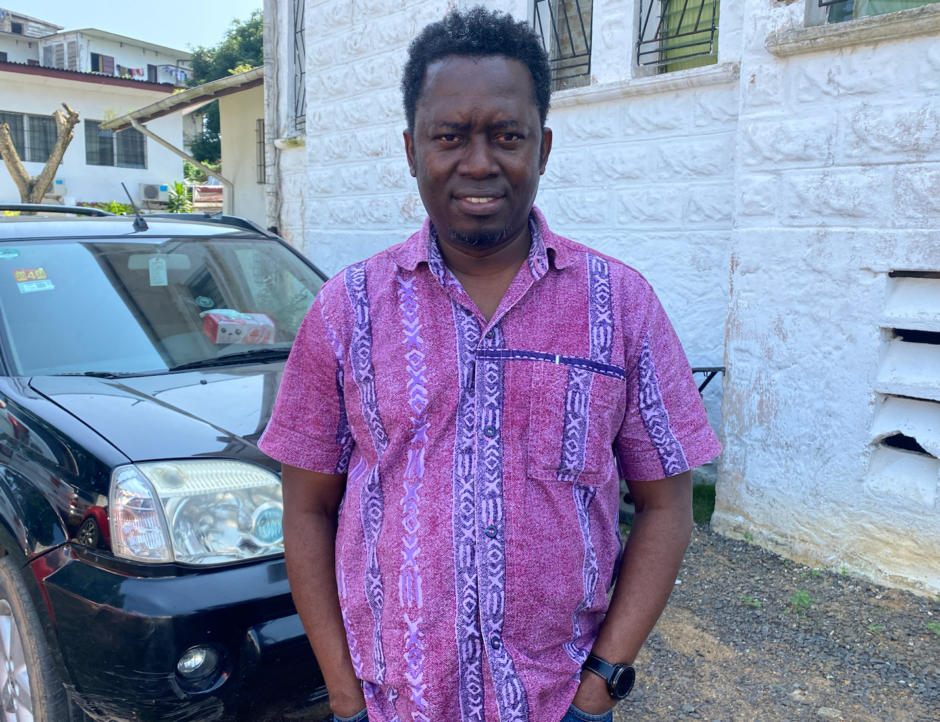
MONROVIA, Liberia—Friday marks twenty years since the official end of Liberia’s brutal civil wars that claimed the lives of estimated 250,000 people. Local and international human rights advocates are holding a conference in Monrovia to commemorate the signing of the Accra Peace Agreement on August 18, 2003. But instead of calling the intervening period “peace” the advocates insist it is only “stability” as long as Liberia does not hold those responsible for the wars to account.
Organizers from the Secretariat for the Establishment of War Crimes Court in Liberia (SEWACCOL), one of the convenors of the event, said it will be attended by presidential candidates, including Cllr. Tiawan Gongloe, standard bearer of the Liberia People’s Party (LPP) and Alexander Cummings, standard bearer of the Collaborating Political Parties (CPP). Organizers said they had received no official response to a request for President George Weah’s participation in the gathering, despite serving his office with “soft and hard copies” of an invitation.
Another group, Liberia Crusaders for Peace, is holding a parallel event on Friday, according to Facebook posts, listing partners as the Liberian government, Ecowas and UNHCR. Ambassador Julie Endee, Executive Director of the group, did not respond to a request for details about the gathering.

Hassan Bility, Director of the Global Justice, and Research Project, one of the groups in SEWACCOL, dismissed the government’s event.
“I believe this is an attempt to undermine the quest for justice,” said Bility by WhatsApp. “How can you commemorate something you don’t respect? We will not pay attention to such political gimmick.”
Organizers of the SEWACCOL event said it will emphasize the importance of justice to build Liberians trust in their government and ensure cohesion for the hard work of building the economy and democratic institutions.

Aaron Weah is a co-campaigner of SEWACCOL, one of the institutions organizing Friday’s event. Credit: Anthony Stephens/New Narratives.
“We want to look back on 20 years of the fight for justice, the fight for reconciliation, the fight for peace and see what has been some of the unfinished business of the peace agreement,” said Aaron Weah, a co-campaigner of SEWACCOL. International human rights organizations—Human Rights Watch and U.S. based, Center for Justice and Accountability, are also supporting the event.
Opponents of the court, including President Weah, have questioned its timing, arguing it risks igniting conflict and diverting attention from easing the economic crisis burdening Liberians. Aaron Weah acknowledges those concerns.
“It’s a valid argument,” said Weah. “It’s an argument that comes from a place of fear. It’s an argument that tend to envision that let’s not rock the boat. But the question anyone would ask, do we have a solid foundation to move ahead? I don’t think so. You have young kids into drugs. Young kids into armed robbery, laying siege to different parts of the country. You can predict the next ten years in Liberia. This will be lawless.”
Liberia has yet to establish a war crimes court to prosecute alleged perpetrators of the wars, as recommended by the Truth and Reconciliation Commission (TRC). Neither Nobel laureate, Ellen Johnson Sirleaf, president for 12 years, nor her successor, Weah, a peace ambassador in Sirleaf’s administration, has supported the establishment of the court. Only Gongloe and Cummings have openly committed to the court should any of them win the poll. Joseph Boakai, who heads the former ruling Unity Party, and is running for president, has not made a commitment to the court since he received the endorsement of Senator Prince Johnson of Nimba County, who is named in the TRC report as one of the “most notorious perpetrators” of the wars. Senator Jeremiah Koung, Boakai’s running mate in October’s elections, and head of Johnson’s political party, the Movement for Democracy and Reconstruction, has backed the court, while warning against it being used to target political opponents.
The court has been a vexing and controversial subject since the TRC handed down its final report in 2009, including a recommendation that those accused of being most responsible for the conflict be tried in a war crimes court. Activists hope the commemoration will reignite conversations about the court ahead of the elections. They have been frustrated to see former wartime leaders, including Johnson, and Grand Gedeh Representative, George Boley seeking re-election. Roland Duo, an alleged warlord with the National Patriotic Front of Liberia (NPFL), who is running for Senator in Nimba County, made headlines this week by claiming he fought longer than Johnson who has served 18 years as Senator and so he “deserved” his reward.
“This old man fought for nine months, and y’all gave him 18 years in the Liberian Senate. How many of you people here don’t know that Roland Duo fought for 14 years in this country?” Front Page Africa quoted Duo as telling a campaign event in Nimba this month. “My people, I’m begging y’all, if y’all gave Senator Johnson 18 years for the nine-month war that he fought, Roland Duo that fought for y’all for 14 years, y’all please give me a chance too.”
Bility said the election presents voters with the best opportunity to punish the alleged warlords.
“I call on the Liberian voters NOT to vote for murderers,” said Bility. “All of the Liberian politicians have failed Liberia. They have also failed justice, their people and themselves. Instead of being sent to prison, where they belong, they are shamelessly accepting salaries from the people they murdered. This is a shame. With the help of the international community, we shall compel their compliance.”

GJRP Director, Hassan Bility with ex-US Amb. Michael McCarthy in 2021.
Justice advocates said they will be pressing candidates for concrete commitments on justice.
“We thought that moving away from verbal commitments, we want to present something like a declaration that can be signed by the candidates who are vying for elections that after this election,” said Adama Dempster, Secretary General of the Civil Society Human Rights Advocacy Platform of Liberia, another organizer of the gathering. “We can use it to hold them accountable.”

Adama Dempster is a lead campaigner for a war crimes court.
This story was a collaboration with FrontPage Africa as part of the West Africa Justice Reporting Project.
